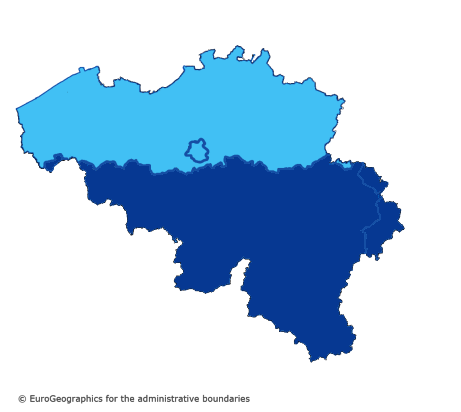
The Walloon Parliament (Parlement wallon) was established on 15 October 1980.
Number of Members of Parliament 75
Length of the parliamentary mandate Five years.
Mode of selection of the Members of Parliament Direct election. For further information,
click here (FR).
Population included in the constituency of the regional parliament 3.479.965 inhabitants.
- Competences (legislative and non-legislative), legal bases and policy areas where the regional parliament is active
- List of committees/sub-committees or working groups in the regional parliament
- Committees in charge of scrutinising subsidiarity
- Staff in charge of subsidiarity scrutiny
- Subsidiarity check
- Cooperation/coordination at the regional level
- Cooperation/coordination at the central level
- Cooperation/coordination at the cross-regional level
- Cooperation/coordination at the EU level
Competences (legislative and non-legislative), legal bases and policy areas where the regional parliament is active Legislative: Social action; airports; agriculture; space planning; budget; external commerce; communication; sustainable development; e-government and administrative informatics; economic affairs; social economy; equality of chances; employment; energy; environment; finances; public function; European structural funds; education; accommodation; mobility; heritage; Marshall plan 2 green; local powers & cities; research, international relations; intra-Belgian relations; rural affairs, nature and forests; health; administrative simplification; sport; statistics; new technologies; tourism; public works. For further information, see http://gouvernement.wallonie.be/competences (FR).
Legal basis: Articles 39 and 134 of the Belgian Constitution and the Special Act of 8 August 1980 on Institutional Reform.
Non-legislative: Election and control of the Regional Executive; control of electoral expenses and communication expenses from Ministers of the Regional Executive; control of the Common Mediation service together with the Parliament of the Federation Wallonia-Brussels; proposals of resolutions (expressing the vision of the parliament on societal issues); examination of petitions; validation of elections; financing of groups and political parties.
List of committees/sub-committees or working groups in the regional parliament The committees/sub-committees include
inter alia:
- Committee on General Affairs, Administrative Simplifications, European Funds and International Relations;
- Committee on Energy, Housing, Public Function and Scientific Research;
- Committee on Budget, Finances, Employment, Education and Sports;
- Committee on Economic Affairs, External Commerce and New Technologies;
- Committee on Internal Affairs and Tourism;
- Committee on Health, Social Action and Equality of Chances;
- Committee on Environment, Space Planning and Mobility;
- Committee on Public Works, Agriculture, Rural Affairs and Heritage;
- Committee on the Verification of Powers;
- Committee on Cooperation with the Federation Wallonia-Brussels and the French Communitarian Commission;
- Committee on the Cooperation with the German Community;
- Advisory Committee Responsible for European Affairs.
For further information, see
http://www.parlement-wallon.be/content/default.php?p=01-04 (FR).
Committees in charge of scrutinising subsidiarity - Advisory Committee Responsible for European Affairs.
Staff in charge of subsidiarity scrutiny The Head of the International Relations Department and his/her Assistant.
Subsidiarity check Nature (selective/systematic): Selective.
Procedure: The Walloon Parliament receives European draft legislative acts and filters them through a competencies test. Only proposals that touch upon Walloon competencies are sent to the members of Parliament. The Parliament has already applied a specific procedure in 2010 as a test case but has not yet integrated this procedure into the internal rules of the Walloon Parliament. However, the internal rules were modified in July 2010 and there are now several references to the subsidiarity check by the Parliament (Articles 48, 115 and 116, available at http://nautilus.parlement-wallon.be/archives/documentation/roi.pdf (FR)). The Advisory Committee Responsible for EU Affairs may formulate an opinion on subsidiarity which is subsequently sent to the plenary session for assessment and possible approval.
Cooperation/coordination at the regional level There is no cooperation/coordination.
Cooperation/coordination at the central level In 2008, the Belgian parliamentary assemblies (at federal, regional and community level) drafted an inter-parliamentary cooperation agreement organising the participation of the regional and community parliaments in the application of the subsidiarity scrutiny mechanism. This agreement has been blocked because of persisting legal and political difficulties, and accordingly, has not yet entered into force. However, the relevant institutions generally apply it de facto in concrete situations. The regional parliaments automatically receive all legislative proposals and consultation documents of the European Commission through the Senate, with no selection or priority-setting. Each parliament can separately and autonomously examine whether the legislative proposal respects the principle of subsidiarity. A system of vote distribution is established, i.e., the two Belgian subsidiarity votes are divided between the federal and the regional levels. There is no need for a consensus on a 'level basis' to make use of the subsidiarity vote. As soon as one chamber (at the federal level) considers a legislative proposal to be in breach of the subsidiarity principle, at least one subsidiarity vote is 'activated'. Furthermore, if (at least) one parliament at the regional/community level has the same opinion, the second subsidiarity vote is also used. All reasoned opinions of the seven parliaments, together with the subsidiarity votes, are sent to the European Commission on behalf of the Belgian parliamentary system, making it clear which opinion has been given by which parliament. For the so-called exclusive legislative proposals (concerning exclusively federal or regional/community competences), the competent level controls the two Belgian subsidiarity votes. Once again, no consensus is needed; it is enough for two regional/community parliaments with a different linguistic status (e.g. the Flemish Parliament (Dutch speaking) and the Walloon Parliament (French speaking)) to consider that a proposal infringes the principle of subsidiarity, to trigger the two Belgian subsidiarity votes in the Early Warning System.
Cooperation/coordination at the cross-regional level See the answer to the previous point.
Cooperation/coordination at the EU level The Parliament participates in CALRE (Conference of European Regional Legislative Assemblies) and consults IPEX (inter-parliamentary EU information exchange platform) and the SMN (Subsidiarity Monitoring Network) of the Committee of the Regions. The Walloon Parliament also has contacts with its permanent representation to the EU.
